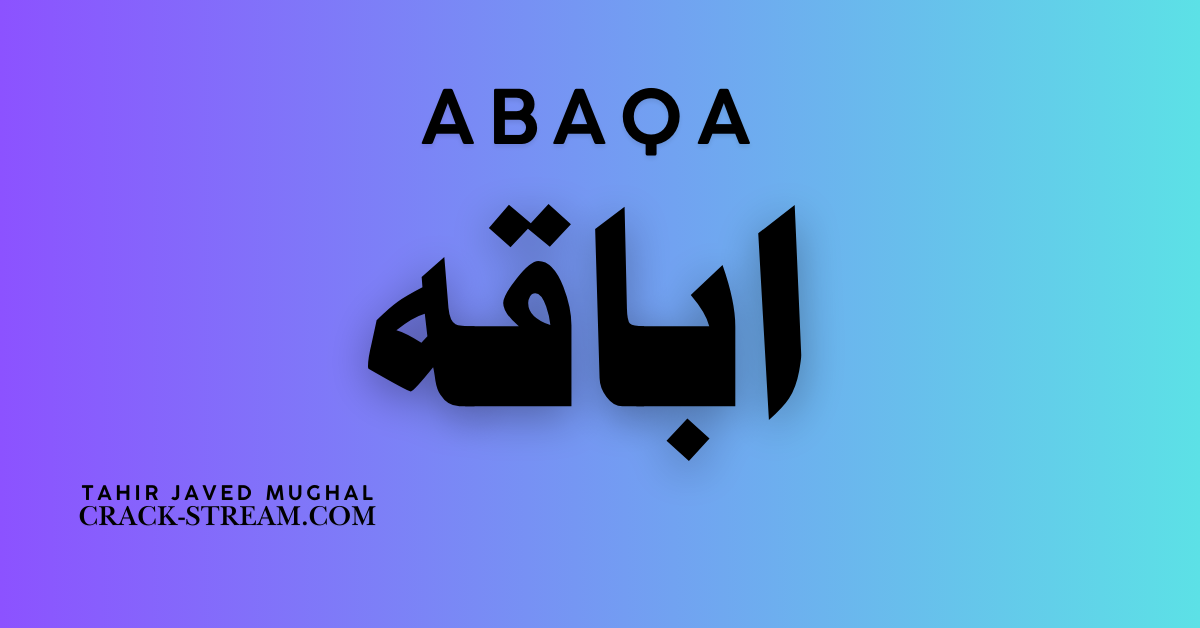ABAQA writing a masterpiece is never an ordinary feat. It requires a mix of talent, dedication, and an unparalleled connection with the subject matter. For the renowned writer Tahir Javed Mughal, the journey of crafting ABAQA was nothing short of extraordinary. The story not only became a labor of love but also marked a defining point in his illustrious career as a storyteller.
The Genesis of ABAQA
Every great story begins with an idea, a spark that ignites the writer’s imagination. For Tahir Javed Mughal, ABAQA started as more than just a story; it was a deep dive into a historical narrative filled with intensity, emotion, and relentless human struggles. From the moment he embarked on this journey, Mughal knew that ABAQA was not an ordinary tale. It demanded his full attention, consuming his time, energy, and thoughts for nearly two years.
The dedication and focus he invested in the story were unlike any of his previous works. As he poured his heart and soul into the narrative, he developed a unique bond with it. It became his “ladla” — his favorite child — as he nurtured it with care, passion, and an unwavering sense of purpose.
A Passionate Connection
Tahir Javed Mughal’s writing process for ABAQA was driven by an intense wave of inspiration. He described the experience as a surge of energy that filled him with excitement and creativity. This energy was particularly evident as he depicted the brutal and merciless acts of the Mongols, the central figures in the story. The raw intensity of their actions demanded vivid descriptions and a powerful narrative, and Mughal rose to the challenge with exceptional storytelling.
For a writer, such moments of inspiration are rare yet precious. Mughal’s ability to channel this passion into his work is what set ABAQA apart from many of his other writings. He did not merely write about the atrocities; he brought them to life, making the reader feel the fear, despair, and resilience of the people who faced such trials.
The Themes of ABAQA
ABAQA is more than just a historical fiction; it is a tale of resilience, human spirit, and the ability to endure even in the face of unimaginable horrors. By choosing the Mongols as the backdrop for his story, Mughal explored a period in history that is both fascinating and terrifying. The Mongols, known for their conquests and unparalleled ruthlessness, serve as a symbol of the relentless forces that test humanity’s will to survive.
Mughal’s narrative dives deep into the psyche of his characters, portraying their struggles, fears, and triumphs with striking realism. This approach not only captures the reader’s attention but also evokes a sense of empathy and connection with the characters. Through their journey, Mughal masterfully illustrates the complexities of human emotions and the unyielding hope that drives individuals to overcome adversity.
Two Years of Immersion
Writing ABAQA was not a task Mughal took lightly. He spent two years meticulously crafting every aspect of the story, from its plot and characters to its historical context and emotional depth. This period of immersion allowed him to explore the nuances of his narrative, ensuring that every detail was authentic and impactful.
Such dedication is rare, and it speaks volumes about Mughal’s commitment to his craft. His willingness to devote so much time and energy to a single story highlights his belief in the importance of creating meaningful and lasting literature.
The Legacy of ABAQA
For Tahir Javed Mughal, ABAQA was more than just another story in his repertoire. It was a testament to his growth as a writer and his ability to tackle complex and challenging themes. The story’s success and resonance with readers cemented its place among his finest works.
ABAQA serves as an inspiration not only for aspiring writers but also for anyone striving to create something extraordinary. It demonstrates the power of dedication, passion, and a deep connection to one’s work. Through ABAQA, Tahir Javed Mughal has left an indelible mark on the world of literature, showcasing the heights that can be achieved when talent meets determination.
Conclusion
The journey of writing ABAQA was a transformative experience for Tahir Javed Mughal. It was a story that demanded his undivided attention, tested his limits, and ultimately became one of his most cherished creations. By capturing the essence of historical turmoil and the resilience of the human spirit, Mughal created a narrative that continues to captivate and inspire readers.
For those who have read ABAQA, it is clear that the story is more than just words on a page; it is a reflection of a writer’s passion, dedication, and belief in the power of storytelling. Tahir Javed Mughal’s journey with ABAQA is a reminder that great stories are born from great efforts, and their impact can last a lifetime.
Download:
To download the ABAQA novels from the download button.










